In a turbulent year for the entire soft drinks sector, the children's drinks market has performed well. According to the British Soft Drinks Association (BSDA), squash is still the most popular soft drink among children. The sub-category performed strongly in 2008 with a 2% rise in value to £446m. Robinsons squash continued to dominate the sub-category and was up by 6% to £195m, while Ribena squash bounced back after a poor 2007 to remain stable in 2008.
Juice drinks, which is also associated with the children's drinks market, held fairly steady, with a decline of just 1% in sales, resulting in a value of £480m. The sub-category was driven by Robinsons Fruit Shoot and Capri Sun with increases of 5% and 11% respectively. However, Ribena slipped back with a 13% decline in sales.
As with other soft drinks categories, the summer is an important time of year when it comes to sales of children's drinks. Besides the children being off school and looking for refreshment, it's also a key opportunity for brands to re-establish themselves in time for the new school year.
"It goes without saying that having a hot summer will lead to more sales of drinks," says Richard Baragwanath, commercial manager for juice drink Sunny D. "The summer is the best period for sales of children's drinks, but it's also important as the lead-up for back to school. Parents want to put something in their children's lunchboxes that they know they'll drink so it's important to increase product awareness over the summer months."
Healthy options
The market has witnessed a wave of product reformulations as manufacturers strive to keep in line with the government's drive towards healthier lifestyles.
Last year the government extended its restrictions on ads for products that were classified as high in fat, sugar or salt so that they could not be aired during programmes normally watched by under-16s. The ban has been in full effect since January.
As well as having their marketing wings clipped, many products were put in an unfavourable light when some of the food colourings they contained were linked with adverse effects on children's behaviour.
Nevertheless, drinks manufacturers have taken these setbacks in their stride and worked hard to improve consumers' perceptions of children's soft drinks. The industry is now working with the government to voluntarily withdraw the ingredients from products by the end of this year.
Jill Ardagh, director general of the British Soft Drinks Association, maintains that the move away from artificial ingredients was already well under way before last year. "Soft drinks manufacturers have been responding to consumers' desire for more 'natural' ingredients for some time now and reformulation, where possible, is ongoing," she says. "As a responsible industry it is essential that we continue to meet consumer needs while maintaining the high levels of safety and quality of our products."
Sunny D, in its former incarnation, received bad press regarding artificial ingredients, but owner Sunny Delight Beverages Company has made huge leaps in making its product healthier. The company set up a parents advisory group to help develop the new and improved Sunny D, which launched in February of this year.
"Initial feedback from the parents advisory group told us that they wanted a product which contained absolutely nothing artificial, yet maintained the same great taste that is unique to Sunny D," says international technical director Lee Taylor.
Sunny Delight continues to meet with its parents advisory group four times a year to ensure that health concerns are being addressed.
Baragwanath believes that this focus on consuming healthy products is a trend that will grow, and that people will take more time to pick what they feel is the healthiest product for them.
"There is definitely a long-term trend towards health; people are looking at labels and have become more savvy. It was very important that we had a good look at the product and remove everything artificial in it."
Emma Hunt, senior brand manager at Vimto, agrees that consumers are more concerned with natural ingredients in their drinks and that it is essential for manufacturers to move away from artificial ingredients.
"Consumers are more clued up in terms of product labelling and ingredients. Vimto was one of the first drinks companies to include Guideline Daily Allowance information on its product labels, and to sign up to a voluntary ban on the six food colours associated with hyperactivity in young children."
Brands willing to embrace the move towards healthier ingredients have the potential to increase sales as parents want to pick the healthiest product available.
Juice drinks, which is also associated with the children's drinks market, held fairly steady, with a decline of just 1% in sales, resulting in a value of £480m. The sub-category was driven by Robinsons Fruit Shoot and Capri Sun with increases of 5% and 11% respectively. However, Ribena slipped back with a 13% decline in sales.
As with other soft drinks categories, the summer is an important time of year when it comes to sales of children's drinks. Besides the children being off school and looking for refreshment, it's also a key opportunity for brands to re-establish themselves in time for the new school year.
"It goes without saying that having a hot summer will lead to more sales of drinks," says Richard Baragwanath, commercial manager for juice drink Sunny D. "The summer is the best period for sales of children's drinks, but it's also important as the lead-up for back to school. Parents want to put something in their children's lunchboxes that they know they'll drink so it's important to increase product awareness over the summer months."
Healthy options
The market has witnessed a wave of product reformulations as manufacturers strive to keep in line with the government's drive towards healthier lifestyles.
Last year the government extended its restrictions on ads for products that were classified as high in fat, sugar or salt so that they could not be aired during programmes normally watched by under-16s. The ban has been in full effect since January.
As well as having their marketing wings clipped, many products were put in an unfavourable light when some of the food colourings they contained were linked with adverse effects on children's behaviour.
Nevertheless, drinks manufacturers have taken these setbacks in their stride and worked hard to improve consumers' perceptions of children's soft drinks. The industry is now working with the government to voluntarily withdraw the ingredients from products by the end of this year.
Jill Ardagh, director general of the British Soft Drinks Association, maintains that the move away from artificial ingredients was already well under way before last year. "Soft drinks manufacturers have been responding to consumers' desire for more 'natural' ingredients for some time now and reformulation, where possible, is ongoing," she says. "As a responsible industry it is essential that we continue to meet consumer needs while maintaining the high levels of safety and quality of our products."
Sunny D, in its former incarnation, received bad press regarding artificial ingredients, but owner Sunny Delight Beverages Company has made huge leaps in making its product healthier. The company set up a parents advisory group to help develop the new and improved Sunny D, which launched in February of this year.
"Initial feedback from the parents advisory group told us that they wanted a product which contained absolutely nothing artificial, yet maintained the same great taste that is unique to Sunny D," says international technical director Lee Taylor.
Sunny Delight continues to meet with its parents advisory group four times a year to ensure that health concerns are being addressed.
Baragwanath believes that this focus on consuming healthy products is a trend that will grow, and that people will take more time to pick what they feel is the healthiest product for them.
"There is definitely a long-term trend towards health; people are looking at labels and have become more savvy. It was very important that we had a good look at the product and remove everything artificial in it."
Emma Hunt, senior brand manager at Vimto, agrees that consumers are more concerned with natural ingredients in their drinks and that it is essential for manufacturers to move away from artificial ingredients.
"Consumers are more clued up in terms of product labelling and ingredients. Vimto was one of the first drinks companies to include Guideline Daily Allowance information on its product labels, and to sign up to a voluntary ban on the six food colours associated with hyperactivity in young children."
Brands willing to embrace the move towards healthier ingredients have the potential to increase sales as parents want to pick the healthiest product available.
retailer opinion
"I've noticed a move towards healthier children's drinks over the past year or two. Parents are starting to become more aware of what they are giving their children and buying accordingly.
"I'm a parent myself and when my children were younger we always tried to give them the sugar-free option.
"While healthier drinks are becoming more popular, some children still have limited pocket money so they have to go for the cheaper option, which isn't always as good for them."
Dave Chew, Dave's Convenience Store, Hertfordshire
"I've noticed a move towards healthier children's drinks over the past year or two. Parents are starting to become more aware of what they are giving their children and buying accordingly.
"I'm a parent myself and when my children were younger we always tried to give them the sugar-free option.
"While healthier drinks are becoming more popular, some children still have limited pocket money so they have to go for the cheaper option, which isn't always as good for them."
Dave Chew, Dave's Convenience Store, Hertfordshire
ones to watch...
Foil fresh
Vimto has released a new 250ml
resealable pouch for its soft drink, especially designed for the kids 'grab on the go' market. The packaging is fully recyclable and the product contains no artificial colours or preservatives.
tel: 01925 222222
Shoots and scores
Robinsons Fruit Shoot has a redesign and two new variants. Orange and summer fruits will replace the orange & peach and strawberry flavours. The entire Fruit Shoot range has been given a new look with greater shelf standout.
tel: 0845 758 1781
Surf and turf
Calypso is extending its links with surfing by launching a nationwide series of surf activities to promote its juicy water brand Aquajuice 67.
The 'Surf Anywhere' events aim to introduce the sport to children in towns and cities.
tel: 01978 668400
Strawberry fields
GlaxoSmithKline (GSK) has launched a 1ltr Ribena strawberry squash. The product is designed to capitalise on the trend for strawberry flavours and GSK hopes that it will drive Ribena squash sales this summer.
tel: 08702 415132
Foil fresh
Vimto has released a new 250ml
resealable pouch for its soft drink, especially designed for the kids 'grab on the go' market. The packaging is fully recyclable and the product contains no artificial colours or preservatives.
tel: 01925 222222
Shoots and scores
Robinsons Fruit Shoot has a redesign and two new variants. Orange and summer fruits will replace the orange & peach and strawberry flavours. The entire Fruit Shoot range has been given a new look with greater shelf standout.
tel: 0845 758 1781
Surf and turf
Calypso is extending its links with surfing by launching a nationwide series of surf activities to promote its juicy water brand Aquajuice 67.
The 'Surf Anywhere' events aim to introduce the sport to children in towns and cities.
tel: 01978 668400
Strawberry fields
GlaxoSmithKline (GSK) has launched a 1ltr Ribena strawberry squash. The product is designed to capitalise on the trend for strawberry flavours and GSK hopes that it will drive Ribena squash sales this summer.
tel: 08702 415132





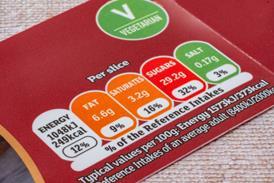
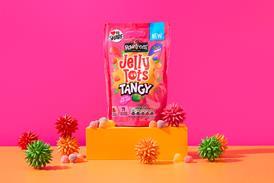














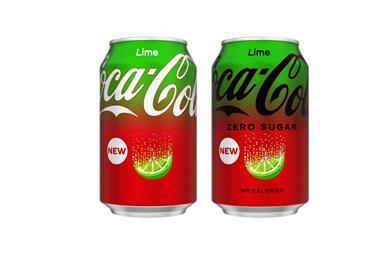


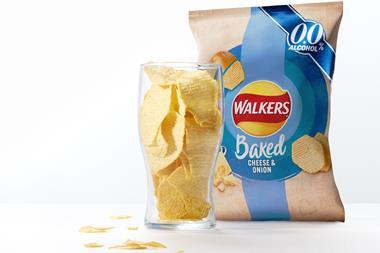
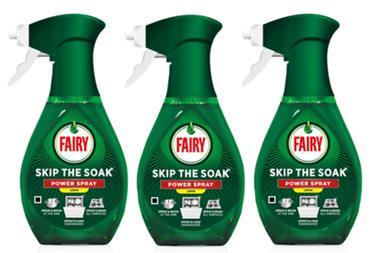
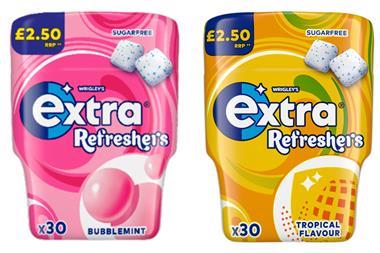

No comments yet